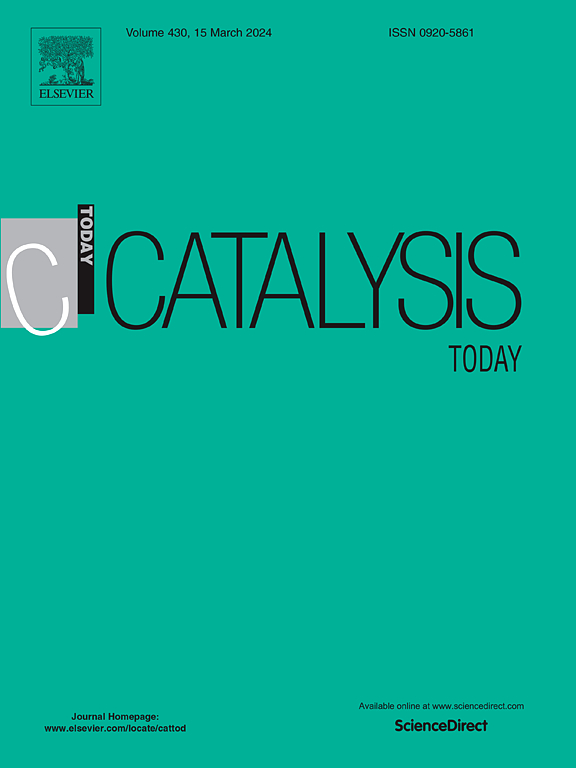Impact of Co addition on the stability of Ni-based catalysts on delaminated smectite for biogas reforming
IF 5.2
2区 化学
Q1 CHEMISTRY, APPLIED
引用次数: 0
Abstract
Biogas is a renewable resource that can be converted into syngas via Ni-catalyzed dry reforming (DR) and serves as a precursor for e-fuel synthesis. However, the high CH₄ content in biogas accelerates Ni catalyst deactivation owing to carbon deposition. In this study, the effect of the Co addition (5 wt%) to a Ni catalyst (10 wt%) supported on delaminated mesoporous smectite for biogas DR was evaluated. Physicochemical characterization revealed that Co doping induces synergistic effects, including Ni-Co alloy formation that mitigates sintering, a decrease in metal particle size from 25.7 nm to 17.1 nm, increased basicity from 120 to 183 μmol·gcat⁻¹, and enhanced reducibility from 90 % to 98 %. Catalytic tests were conducted at 700 °C and 25 L·gcat⁻¹·h⁻¹ using a synthetic biogas mixture (CH₄/CO₂/N₂ = 45/35/20) without prior H₂ reduction. Co incorporation improved catalyst stability by reducing carbon accumulation, likely due to enhanced gasification. In contrast to the higher values observed for the Ni-only catalyst, the H₂/CO ratio for the Ni-Co catalyst remained in the range of 1–2. Additionally, no severe re-oxidation or sintering of the metallic phase was observed. The coke formed mainly consisted of low-crystallinity multi-walled carbon nanotubes, which were oxidized at lower temperatures for the Ni-Co catalyst. Regeneration by carbon combustion at 700 °C resulted in a maximum loss of 10 % in CH₄ conversion and 5 % in CO₂ conversion per cycle, with a 9.7 % increase in the carbon mass. These results highlight the potential of Ni-Co catalysts for stable biogas DR with improved regenerability.
Co添加量对脱蒙脱石ni基催化剂稳定性的影响
沼气是一种可再生资源,可以通过镍催化干重整(DR)转化为合成气,并作为电子燃料合成的前体。然而,沼气中较高的CH₄含量会加速Ni催化剂因积碳而失活。在本研究中,考察了Co(5 wt%)对脱层介孔蒙脱石负载的Ni催化剂(10 wt%)的影响。物理化学表征表明,Co掺杂诱导了协同效应,包括Ni-Co合金的形成减轻了烧结,金属粒度从25.7 nm减小到17.1 nm,碱度从120增加到183 μmol·gcat⁻¹,还原性从90 %提高到98 %。催化试验在700°C和25 L·gcat⁻¹·h⁻¹下进行,使用合成的沼气混合物(CH₄/CO₂/N₂= 45/35/20),没有预先还原h₂。Co掺入通过减少碳积累来提高催化剂的稳定性,这可能是由于气化能力的增强。与纯ni催化剂相比,Ni-Co催化剂的H₂/CO比值保持在1-2之间。此外,没有观察到严重的金属相再氧化或烧结。形成的焦炭主要由低结晶度的多壁碳纳米管组成,这些碳纳米管在较低温度下被Ni-Co催化剂氧化。在700℃下碳燃烧再生,每循环最大损失10 %的CH₄转化率和5 %的CO₂转化率,碳质量增加9.7% %。这些结果突出了Ni-Co催化剂在稳定的沼气DR中具有提高可再生性的潜力。
本文章由计算机程序翻译,如有差异,请以英文原文为准。
求助全文
约1分钟内获得全文
求助全文
来源期刊

Catalysis Today
化学-工程:化工
CiteScore
11.50
自引率
3.80%
发文量
573
审稿时长
2.9 months
期刊介绍:
Catalysis Today focuses on the rapid publication of original invited papers devoted to currently important topics in catalysis and related subjects. The journal only publishes special issues (Proposing a Catalysis Today Special Issue), each of which is supervised by Guest Editors who recruit individual papers and oversee the peer review process. Catalysis Today offers researchers in the field of catalysis in-depth overviews of topical issues.
Both fundamental and applied aspects of catalysis are covered. Subjects such as catalysis of immobilized organometallic and biocatalytic systems are welcome. Subjects related to catalysis such as experimental techniques, adsorption, process technology, synthesis, in situ characterization, computational, theoretical modeling, imaging and others are included if there is a clear relationship to catalysis.
 求助内容:
求助内容: 应助结果提醒方式:
应助结果提醒方式:


